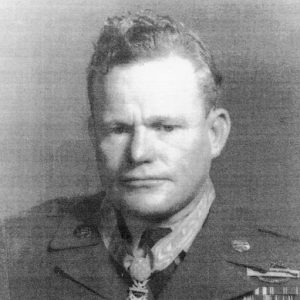calsfoundation@cals.org
Hubert L. Lee (1915–1982)
Hubert L. Lee, who lived in North Little Rock (Pulaski County) as a child, was a soldier in the U.S. Army who received a Medal of Honor for his heroic actions in battle during the Korean War.
Hubert L. Lee was born in Arburg, Missouri, on February 2, 1915, the son of railroad fireman Charles Lee and Beulah Lee. Five years later, they were living in North Little Rock’s Ward 4.
The family later moved to Leland, Mississippi, and it was there that Lee was inducted into the U.S. Army during World War II. He served with distinction, winning a Bronze Star and Silver Star for heroism in fighting in North Africa and Italy. Lee remained in the army and had risen to the rank of master sergeant when the United States became involved in the Korean War. He served in Company I, Twenty-Third Infantry Regiment, Second Infantry Division.
On February 1, 1951, Company I was holding a position near Ip’o-ri, Korea, part of a United Nations force including elements of the U.S. Twenty-Third Regiment and Thirty-Seventh Field Artillery Battalion along with a contingent of French soldiers, when they were attacked by a large force of Chinese Communist soldiers. Company I was driven from its position, and Lee’s platoon leader was wounded.
Lee took command of the survivors of his platoon and commenced an assault on their original position, now in possession of the Chinese troops. Advancing to within twenty-five yards of their goal, Lee was wounded in the leg by grenade fragments but refused aid and continued the attack. The small group of U.S. troops was forced to retreat five times, but each time Lee would rally the remaining soldiers to move forward once more.
During the final attack, an exploding grenade knocked Lee over, causing serious wounds in both legs, but the master sergeant began crawling forward, calling his men to join him as he rose to his knees to fire on the enemy. Wounded a third time by small-arms fire, Lee continued crawling forward and leading his troops in successfully taking their objective. All but ten of Lee’s men were either killed or incapacitated by wounds. The Americans lost twenty-two dead and fifty-five wounded while inflicting eighty-three dead and around 200 wounded on the Chinese troops. Lee’s “intrepid leadership and determination led to the destruction of 83 of the enemy and withdrawal of the remainder, and was a vital factor in stopping the enemy attack,” his Medal of Honor citation states.
Lee recovered from his wounds and returned to duty on May 26, 1951. He and another soldier each received a Medal of Honor from President Harry Truman in a White House ceremony on January 29, 1952.
After the Korean War, Lee remained in the army, eventually serving in Alaska where he married Dorothy B. Ream in Anchorage on April 19, 1956. He retired from the army in 1958 and worked civil service jobs in Alaska for ten years before returning to Leland. He died there of a heart attack on November 5, 1982, and is buried in Stoneville-Leland Cemetery in Mississippi.
For additional information:
Ecker, Richard E. Korean Battle Chronology: Unit-by-Unit United States Casualty Figures and Medal of Honor Citations. Jefferson, NC: McFarland Publishing Co., 2005.
Medal of Honor Recipients 1863–1978, Prepared by the Committee on Veterans Affairs, United States Senate, February 14, 1979. Washington DC: Government Printing Office, 1979.
“Unusual Sergeant Buried with Honors.” Clarksdale Press-Register, November 11, 1982, p. 5B.
“Veteran Hubert Lee Was a Quiet Hero.” Clarion-Ledger, November 11, 1982, p. 1A, 24A.
Mark K. Christ
Central Arkansas Library System
 Military
Military World War II through the Faubus Era, 1941 through 1967
World War II through the Faubus Era, 1941 through 1967 Hubert L. Lee
Hubert L. Lee 



Comments
No comments on this entry yet.